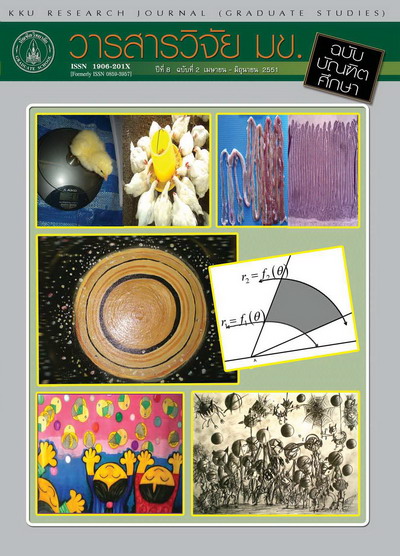Political Media Messages and Their Relationships With Audienceûs Attitudes Toward the Former Prime Minister Thaksin Shinawatra
Keywords:
Political Media Messages(ข่าวสารทางการเมือง), Political attitudes(ทัศนคติทางด้านการเมือง), Former Prime Minister Thaksin Shinawatra(พันตำรวจโท ดร.ทักษิณ ชินวัตร)Abstract
The purpose of this research project was to study the correlations between the audience’s exposure to nine characteristics of political media messages as the independent variables and their political attitudes toward the former Prime Minister Thaksin Shinawatra as the dependent variables. The study also aims to investigate the Two-Step Flow of Communication Model. With the use of the purposive sampling technique, student samples who are member of the Political Assembly in the universities in the Bangkok area that have played a prominent role in Thai politics were selected as the research participants. The sample size is 300. The survey questionnaires were based on the political information during the early 2001 and mid 2006 from print media (such as newspapers, magazines, and political books) and online media. The research findings reveal that the audience’s exposures to five characteristics of political media messages (such as logical arguments, logical and emotional arguments, two-sided messages, persuasive messages, and political media messages with political opinion leaders’ comment or ideas) are correlated negatively with their political attitudes toward the former Prime Minister Thaksin Shinawatra. In other words, the more the college students were exposed to such political media messages, the more their attitudes were likely to be negative toward the former Prime Minister Thaksin Shinawatra. In addition, the college students’ exposure to the political messages via both mass media and political opinion leaders are significantly correlated with their negative attitudes toward the former Prime Minister Thaksin Shinawatra. However, the last hypothesis developed from the notion of the Two-Step Flow of Communication Model is not supported.
การวิจัยนี้มีจุดมุ่งหมายเพื่อศึกษาหาความสัมพันธ์การเปิดรับข่าวสารทางการเมืองที่ถูกนำเสนอผ่านสื่อมวลชนกับทัศนคติทางด้านการเมืองของผู้รับข่าวสารต่อพันตำรวจโท ดร.ทักษิณ ชินวัตร รวมถึงได้นำทฤษฏีการสื่อสารสองขั้นตอน(Two-Step Flow Theory)มาเป็นกรอบทางทฤษฏีเพื่อศึกษาบริบทการสื่อสารทางการเมืองในประเทศไทย(Star and Hughes, 1950)การวิจัยครั้งนี้เป็นการวิจัยเชิงสำรวจโดยใช้แบบสอบถามเป็นเครื่องมือในการเก็บรวบรวมข้อมูล กลุ่มที่ใช้ในการศึกษาคือ นักศึกษาระดับอุดรศึกษาขึ้นไปในเขตกรุงเทพมหานครและเป็นสมาชิกในชมรมที่เกี่ยวข้องทางด้านการเมืองเท่านั้น จำนวน 300 คนโดยใช้กลุ่มสุ่มตัวอย่างแบบเฉพาะเจาะจง(Purposive Sampling Technique) ในการทดสอบสมมุติฐานเพื่อวิเคราะห์หาค่าสัมประสิทธิ์สัมพันธ์ระหว่างตัวแปรอิสระและตัวแปรตาม โดยใช้สถิติPearsonûs Product Moment Correlation Coefficient ผลการวิจัยสรุปว่า การเปิดรับข่าวสารทางการเมืองที่ถูกนำเสนอผ่านสื่อมวลชนและข่าวสารทางการเมืองที่นำเอาคำพูดหรือความคิดเห็นของผู้นำความคิดมาตีพิมพ์ผ่านสื่อมวลชนมีความสัมพันธ์กับทัศนคติทางด้านลบของผู้รับข่าวสารต่อพันตำรวจโท ดร.ทักษิณ ชินวัตร รวมถึงผลงานวิจัยชี้ให้เห็นว่าผ้นำทางความคิดทางการเมืองไม่ได้เป็นตัวแปรแทรกแทรงในทฤษฏีการสื่อสารสองขั้นตอน(Two-Step Flow Theory)



